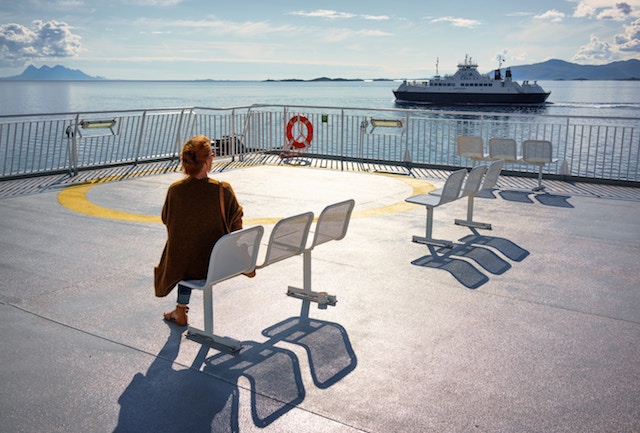6 Tips for Traveling with an Illness

While recovering from a long-term illness, I was excited–and nervous to start traveling again. It had been over a year since I’d flown internationally–which is a long time for someone who was used to flying halfway across the world twice a year for months at a time.
Now, as much as I wanted to deny it, I knew that my travels would have to be a little different. I would have to pack slightly differently and take new precautions, but I definitely did not want to be held back.
Here are six tips for traveling with an illness:
6 Tips for Traveling with an Illness
1. On your first trip after a difficult time, travel with someone you love.
After spending the better part of five months in bed, my mother decided it was time to get me out of the city for a three-day trip to the Hamptons. The Hamptons, better known as the Sex and the City or Gossip Girl getaway, is only a few hours from my parents’ home. But, the idea of being further than a short trip to my doctor terrified me.
I had suffered from an eye parasite that blinded me and basically knocked me out for my last semester in college. The weekend we planned to go fell over the time when I was supposed to stop my medication to see if the parasite was fully gone.
My mother let me know that we’d stay in the Hamptons for one night and only extend if I was feeling well enough. Traveling with my mother on a flexible schedule ended up being the perfect cocktail. Though I had a few moments of panic, we had a wonderful time, going to the beach, biking, soaking in the beautiful landscape, and of course, seeing the second Sex and the City movie, which had just been released.
2. Find the contact information of local doctors.
About a week after one unplanned eye surgery, I was set to travel to San Francisco to visit a friend. Though I was no longer in pain, I was still nervous about experiencing a mishap far from home. My eye doctor gave me his blessing to go, and also the contact information of a local eye doctor who could help me in case any issues arose. Thankfully nothing went wrong, but I felt much more confident knowing there was someone who could help me if need be.
3. Rest when you need to.
As anyone who has had surgery knows, surgery is exhausting. Though it may be localized, it takes a huge toll on your body and it’s very important to take the time to heal.
On that same trip to San Francisco, I was often very tired–which meant I was a vastly different person from my regular caffeinated self, who wants spend every hour of the day soaking in my destination.
My friend was aware of what I’d just gone through and followed my lead in terms of sightseeing, allowing me ample opportunities for down time. It ended up being an extremely revitalizing trip.

4. Pack your medication well and think about how you will transport it in advance.
After all of my surgeries, I started experiencing severe dry eye, which required me to take refrigerated eye drops. This, I felt, would definitely put a dent in my travel plans. I would have to figure out how to keep them cold 24/7.
Ben, my boyfriend at the time (now my husband) and I planned a big trip to Romania and Israel, which would involve long flights, layovers, and tons of moving around. I bought a soft cooler with lots of space for several ice packs. Halfway through the first flight, I requested that the flight staff give me a bag of ice to continue to keep the medication cold. Because it was for medication, the flight staff was extremely accommodating.
Six Tips for Traveling with an Illness
At hotels, I either requested a mini fridge in our room if it didn’t come with one, or I requested that the hotel staff put the medication in its refrigerator and the ice packs in its freezer. There was never an issue with this.
On one long hike, Ben and I took turns holding the cooler. The only thing we decided to forego was an overnight train ride to Kishinev, Moldova, because the ice situation didn’t seem practical. In the grand scheme of things, I think it’s okay that I missed out on Moldova–that time.

5. Ask for what you need.
You know the phrase, “Ask and you shall receive”? It’s true. There were countless times when I asked restaurants to put my medication in their refrigerators, and they almost always said yes. This is your health–do not be afraid to ask for what you need.
6. Expect some inappropriate questions.
In the US, almost no one commented on my eye’s appearance–though it definitely looked like something was going on–probably because it’s just not considered polite to comment on others’ defects.
But once I landed in Israel, the questions did not stop. Random strangers, waiters, cashiers, children, and peers would all look at me in shock and exclaim, “What happened to your eye?!”
At first it was a huge jolt and made me feel very uncomfortable, but then I started to realize that people just genuinely wanted to know. After I told them, they had a million follow up questions and would always wish me good health in the future.
Don’t let your chronic illness hold you back from traveling.
People in different areas respond differently to sickness and physical appearance and after I overcame my surprise, I actually started to embrace the locals’ interest and concern.
Don’t let your chronic illness hold you back from traveling. Just be honest with yourself and the people who love you about your needs, plan ahead, and also, have faith in the kindness of strangers.
Six Tips for Traveling with an Illness Related Reading
Have you traveled with an illness? Do you have tips you’d like to share? Email us at [email protected] for information about sharing your experience and advice with the Pink Pangea community. We can’t wait to hear from you.
Photo credits for Six Tips for Traveling with an Illness by Rachel Sales and Unsplash.









Thank you for your kind words, Tanya. If you want to share your own experiences, please be in touch!
Rachel, this touched a cord, thank you sharing your experience. Ever since my injury and recovery, I too try to be extra careful because the need to get on the road is always higher than physical discomfort 🙂